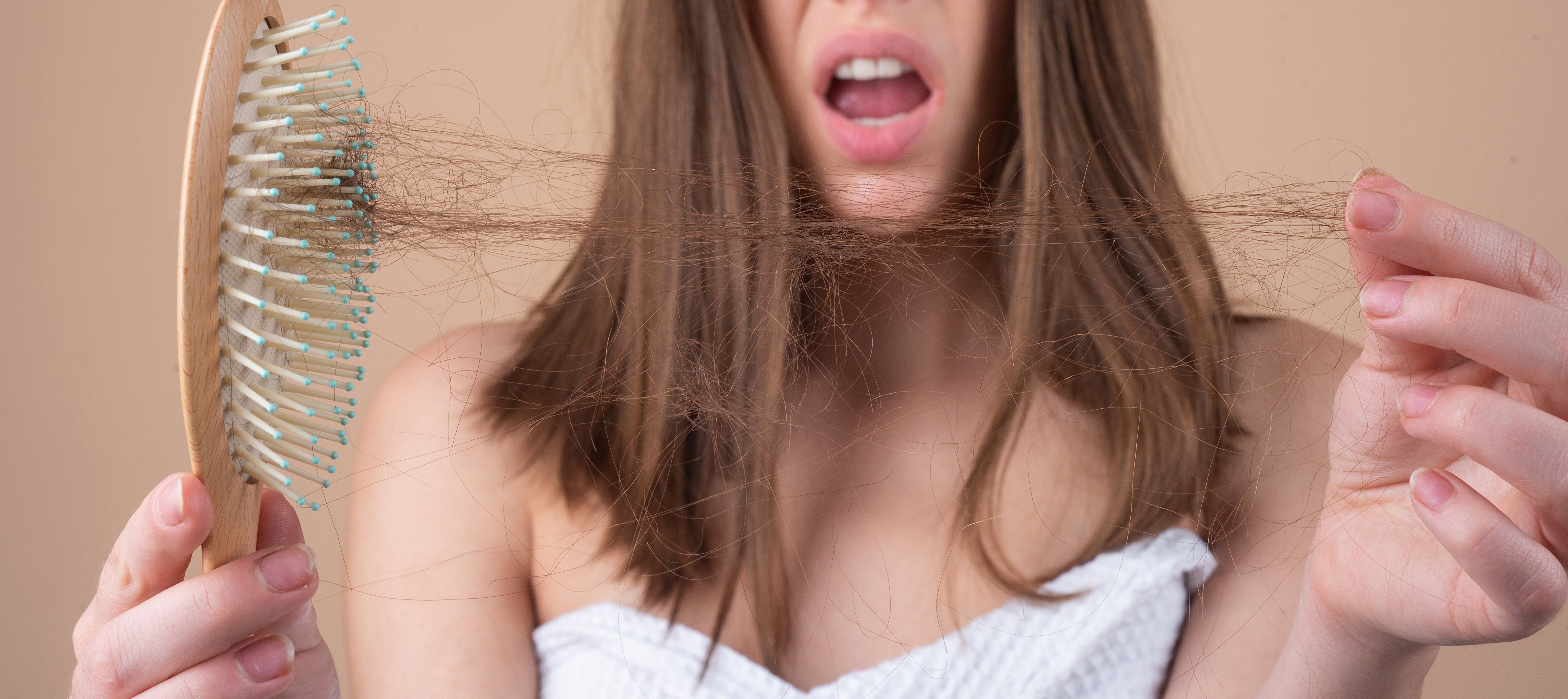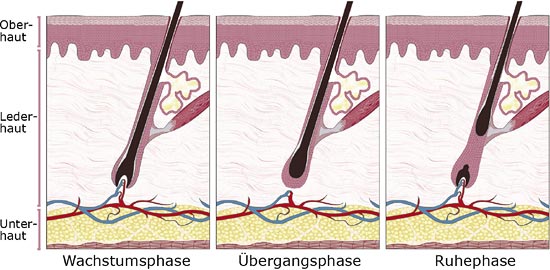
When do we talk of hair loss?
Tell me more about the growth cycle of a hair!

Reasons for hair loss
Stress and chaos can be found at the top of the list of reasons for hair loss. Constant time pressure, round-the-clock availability and a schedule that is far too full lead to mental and physical strain in the long run. Hair suffers in particular in times of stress, because strain negatively affects the lifespan of the hair follicle.
An incorrect or inadequate diet, as well as switching to a different diet or dieting, can lead to a lack of nutrients and vitamins. The lack of zinc, iron, vitamins A and D in particular leads to brittle, fragile and lackluster hair. In the case of a severe deficiency, this leads to hair loss.
Hair loss during pregnancy can be caused by an iron deficiency. You should always clarify this with your doctor, and iron supplements should not be taken independently.
In fact, the opposite can often be observed: in many cases, the female sex hormone estrogen makes sure that your hair stays shiny and full during pregnancy. Estrogen also ensures that women have up to 10% more hair on their heads during pregnancy, because more hair enters the growth phase. Hair that is already in the growth phase also stays in this phase longer.
This goes away about 2-3 months after birth. The result: more and more hair falls out, and your hair also looks dull and thin.
Hair loss after pregnancy is a temporary problem. What is important is to eat a healthy and balanced diet after you have reached term. Going on a diet, on the other hand, can lead to a deficiency and increase of hair loss.
Significant hair loss can occur after discontinuing the contraceptive pill. Most of these preparations contain estrogens for contraception. Discontinuation leads to a severe reduction in estrogen levels, similar to after childbirth. This may not only cause hair loss, but also a severe worsening of your complexion. These symptoms usually go away after a period of time. However, they can lead to a permanent deterioration in hair quality.
A whole range of physical symptoms occur during menopause. One of them is hair loss. During the hormonal changes in the body, the estrogen level decreases, and the male sex hormones rise above it. The hair roots react to this. Consequently, in most cases, hereditary (androgenetic) hair loss occurs.
Certain medications, chronic illnesses, thyroid dysfunction, or eating disorders are other causes of hair loss. You should always discuss these with your doctor.
Types of hair loss
Thyroid dysfunction, iron deficiency, stress, certain medications, or hormonal changes (e.g. by discontinuing the contraceptive pill or through menopause) are causes of diffuse hair loss. Women are affected more by this than men. Diffuse hair loss results in uniform thinning of the hair. The hair follicle stops growing and enters the resting phase. The hair falls out during this period.
The most common form of hair loss in women and men is hereditary hair loss. It affects men more often than women, and approx. 80% of men will go on to suffer from this form of hair loss during their lifetime. They develop a receding hairline with the hairline receding from the forehead. The hair at the back of the head also becomes thinner until only a ring of hair remains at the nape and the sides.
The cause of androgenetic hair loss is the male sex hormone testosterone which damages the hair roots. Men who suffer from hereditary hair loss produce more testosterone. Genetics causes the hair roots to react much more sensitively to the sex hormone and hair loss occurs.
40% of all women struggle with androgenetic hair loss. The reason is the same as for men: hypersensitivity of the hair roots to testosterone. As a result, the growth phases are significantly shortened, and the hair becomes thinner and ultimately falls out.
In women, hereditary hair loss is most noticeable from the thinning of the crown on the head. However, as long as women produce enough estrogen an onset does not occur. However, if the hormonal balance changes significantly (e.g. due to pregnancy, discontinuing the contraceptive pill or menopause) androgenetic hair loss can become apparent.
Seasonal hair loss in autumn and winter is a result of too much exposure to UV rays. The risk of hair loss increases in the autumn and winter months due to the intense sunlight in summer. UV rays slow down the release of the hormone melatonin. Melatonin plays a crucial role in hair growth. Reduced melatonin production first becomes noticeable in winter. Seasonal hair loss can also occur in spring.
In addition, hair loss can be triggered by seasonal illnesses such as the flu or colds. The body needs more energy for its own defenses during bouts of illness. This reduces the supply to the hair and leaves it looking dull and brittle and it falls out faster.
Around one million people in Germany suffer from circular hair loss. This is an autoimmune disease in which the body's own tissue is attacked. This affects both the roots of the hair on the head and other parts of the body. This type of hair loss occurs more often in children and young adults up to the age of 30. Women are affected far more often than men. Circular hair loss often starts suddenly and bald patches form within a very short period of time, which look like they have been pulled out.
An inflamed scalp can lead to patchy hair loss. Prompt treatment is particularly important here. This is the only way to prevent severe scarring of the scalp and permanent hair loss.
Strong pulling or pressure on the scalp from wearing tight braids can cause hair loss.
Hair loss in women
Women are affected by diffuse hair loss far more often than men. The hair becomes increasingly thinner and the scalp becomes visible. Diffuse hair loss is often the result of strong hormonal changes, such as those caused by childbirth, menopause or discontinuing the contraceptive pill. In cases like these, however, the hair growth usually regulates itself again. Other causes of diffuse hair loss can be metabolic conditions, radiation therapy, medication, or a poor diet.
Circular hair loss is an autoimmune disease which affects women more often than men. The condition usually improves without treatment.
Every second woman suffers from hereditary hair loss. The area around the crown also becomes thinner here. The sides and back of the head can also be affected. Normally, complete baldness does not occur.
Hair loss in men
Two thirds of all men suffer from hereditary hair loss. The hair usually recedes on the forehead first and a receding hairline forms. In addition, the hair on the top of the head often thins out, while a fringe of hair is left at the nape and on the sides.
How can I prevent hair loss?
Various causes exist that lead to hair loss. We can't control all of them, but some types of hair loss can be prevented. Hair loss due to symptoms of deficiency, such as iron deficiency can often be prevented with a balanced diet.
Preventing hair loss caused by braids that are too tight is very simple. Loosely braided hair, wearing your hair up in a pigtail or hair worn loose is gentle on the scalp and hair roots
A balanced lifestyle is the best protection against stress as a trigger for hair loss. Adequate sleep and periods of relaxation and plenty of exercise fortify the body and psyche, reduce stress and hence lower the risk of hair loss.
Seasonal hair loss is best prevented in summer. It is important to
What can I do against hair loss
Hair follicle size and health is key to stimulating hair growth and preventing and reducing hair loss. Features of healthy and thick hair are large hair follicles, good nutrition by the hair papilla and a correspondingly strong anchoring of the hair in the scalp.
Hair care products that contain the active ingredient Capixyl TM are based on the combination and joint action of skin-like peptides and red clover extracts. Red clover extract is rich in Biochanin A and helps prevent hair shrinkage. The skin-like peptide it contains stimulates the tissue around the hair follicle and enlarges it. This also improves the anchoring of the hair in the scalp. At the same time, inflammation is reduced. This results in fuller, thicker, and healthier looking hair.
When treating hair loss, however, you should always look at the cause. Hereditary hair loss can be treated well with minoxidil solution. This is also available in over-the-counter hair tonics from pharmacies. In the case of hereditary hair loss, a hair transplant can be considered by those affected if they perceive it as a burden.
In the event of severe hair loss, it is always advisable to consult a dermatologist first. You can support the treatment of hair loss in a targeted way with nutrients and restorative substances, such as B vitamins, amino acids, and minerals. Hair loss during pregnancy should also be monitored and treated by a doctor. Hair loss during pregnancy is usually a side effect of hormonal changes and disappears on its own. However, sometimes there is evidence of an iron deficiency, which should always be corrected under medical supervision.
A common consequence of hair loss, especially in women, is the psychological stress caused by thinning hair. And although this is easier said than done, a strong composure is needed, which requires practice. This is because the pressure that many women and men experience in the face of certain body image ideals causes psychological stress – which in turn can lead to even greater hair loss.
Patience is always needed when treating hair loss. Whether and how quickly it can be remedied depends primarily on the cause and, secondly, on the speed at which your hair grows. Accordingly, noticeable successes often first become visible a few months later.
In addition to using methods of treatment based on cause, both a healthy and balanced diet and nourishing and massaging the scalp with moisturizing hair masks can contribute to alleviating the problem. Certain foods act as veritable hair superfoods from the inside and out – and can even be found in the shampoo and conditioner that are especially formulated for your hair from Yours Truly.

Stay in the loop! Sign up to receive our newsletter for all the latest in hair care.
*You will receive 5,00 € discount from a purchase value of 50,00 €. One time offer, not combinable with other promotions and not eligible for cash payment.
